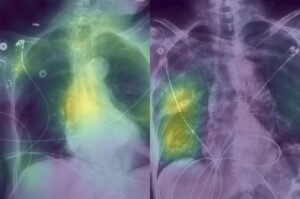Most human oocytes never get a chance to mature into eggs—a new study sheds light on why.
The post First atlas of the human ovary with cell-level resolution is a step toward artificial ovary appeared first on Michigan Engineering News.
Most human oocytes never get a chance to mature into eggs—a new study sheds light on why.
The post First atlas of the human ovary with cell-level resolution is a step toward artificial ovary appeared first on Michigan Engineering News.
Particles that gum up the keys that the virus uses to enter cells could one day be an effective COVID treatment whenever vaccines and other treatments fall short.
The post Targeting multiple COVID variants through the twist in the spike protein appeared first on Michigan Engineering News.
When using only data collected before patients with sepsis received treatments or medical tests, the model’s accuracy was no better than a coin toss.
The post Widely used AI tool for early sepsis detection may be cribbing doctors’ suspicions appeared first on Michigan Engineering News.
University of Michigan researchers examine if molecular compounds in exhaled breath could lead to improved diagnosis and tracking of acute respiratory distress syndrome (ARDS).
The post U-M team receives NIH grant for collaborative research to speed ARDS diagnosis appeared first on Michigan Engineering News.
An effort to create a control model that moves seamlessly between different activities like standing, walking and climbing stairs is renewed by the National Institutes of Health.
The post Better prosthetics: $3M to develop more natural robotic leg control appeared first on Michigan Engineering News.

Regulators pinned their hopes on clinicians being able to spot flaws in explanations of an AI model’s logic, but a study suggests this isn’t a safe approach.
The ability to accurately detect where X-rays land and in what dose could reduce the collateral damage from radiation therapy.
The post Tracking radiation treatment in real time promises safer, more effective cancer therapy appeared first on Michigan Engineering News.
Tested without needing hospitals to share data, the method for developing the model could speed further improvements in medical prediction tools.
The post Open-source patient model tops industry standard appeared first on Michigan Engineering News.
Material and size designed to give electrodes a chance to operate in the body for years.
The post Carbon fiber brain-implant electrodes show promise in animal study appeared first on Michigan Engineering News.
Equipment previously used in auto emissions testing highlights risks.
The post Dentistry during COVID-19: Engineering analysis offers guidelines to reduce exposure appeared first on Michigan Engineering News.